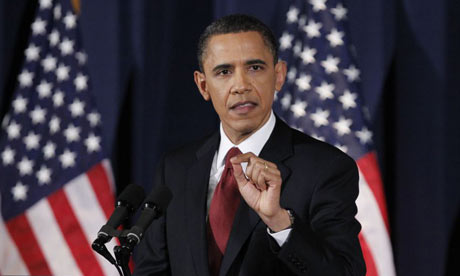Obama on Libya: a Goldilocks doctrine gambling on Gaddafi's exit
Barack Obama made an intelligent, consistent case for limited US intervention in Libya, gambling on the toppling of Gaddafi

The cable news talking heads wanted to call it the "Obama doctrine", butBarack Obama's speech outlining his decision to intervene in Libyaagainst the Gaddafi regime only added a new wrinkle to what we already know about the president's attitudes towards war and peace.
Back in 2002 Obama gave a memorable speech that defined the hot case for unilateral US intervention and the deployment of US troops: Afghanistan, the result of a direct threat against the United States . The same speech attacked its cold opposite: what Obama called the "dumb war" of the invasion of Iraq, where US national interests were not directly involved.
Last night, in his televised address from the National Defense University at Fort McNair, Obama introduced an intermediate category for US military intervention: when there is support from the international community, when widely-defined US "interests and values" are at stake, when there is support from regional actors, and when there is a clear and urgent humanitarian demand.
In other words, when the global temperature is "just right". Call it the Goldilocks doctrine. Or, in Obama's description:
In other words, when the global temperature is "just right". Call it the Goldilocks doctrine. Or, in Obama's description:
We had a unique ability to stop that violence: an international mandate for action, a broad coalition prepared to join us, the support of Arab countries, and a plea for help from the Libyan people themselves. We also had the ability to stop Gaddafi's forces in their tracks without putting American troops on the ground.
The needle Obama had to thread last night was distinguishing intervention in Libya from the other potential conflicts in the region, while still making a robust case for taking action that didn't extend towards an invasion. That involved a degree of having it both ways, but Obama did deliver a crushing dismissal of more aggressive action against Gaddafi.
"We must always measure our interests against the need for action," Obama stated. But the ultimate step, of an invasion to drive out Gaddafi, could not be justified:
If we tried to overthrow Gaddafi by force, our coalition would splinter. We would likely have to put US troops on the ground, or risk killing many civilians from the air. The dangers faced by our men and women in uniform would be far greater. So would the costs, and our share of the responsibility for what comes next.To be blunt, we went down that road in Iraq. Thanks to the extraordinary sacrifices of our troops and the determination of our diplomats, we are hopeful about Iraq's future. But regime change there took eight years, thousands of American and Iraqi lives, and nearly a trillion dollars. That is not something we can afford to repeat in Libya.
In doing so, Obama rebuffed the shrill charges of those Republicans who want to use any stick to beat him with. But that of course wouldn't stop them. Rudy Giuliani – for some reason elevated to foreign policy pundit by Piers Morgan on CNN – accused Obama of timidity: "You either go in or you don't go in." John McCain hilariously did the same: "When Reagan attacked Tripoli he didn't assemble a coalition."
Indeed, by Giuliani's and McCain's standards Ronald Reagan was far weaker than Obama towards Libya and Gaddafi. In 1986 Reagan ordered US warplanes to attack Gaddafi's regime . The US took no further military action, Gaddafi remained in power, and the Lockerbie tragedy followed.
The hole in Obama's speech was his refusal to offer any limiting terms for US engagement. If Gaddafi hangs on somehow, then eventually Obama will have to come up with an answer. By not doing so last night he gambled that he may never need to:
Despite the success of our efforts over the past week, I know that some Americans continue to have questions about our efforts in Libya. Gaddafi has not yet stepped down from power, and until he does, Libya will remain dangerous.
No comments:
Post a Comment